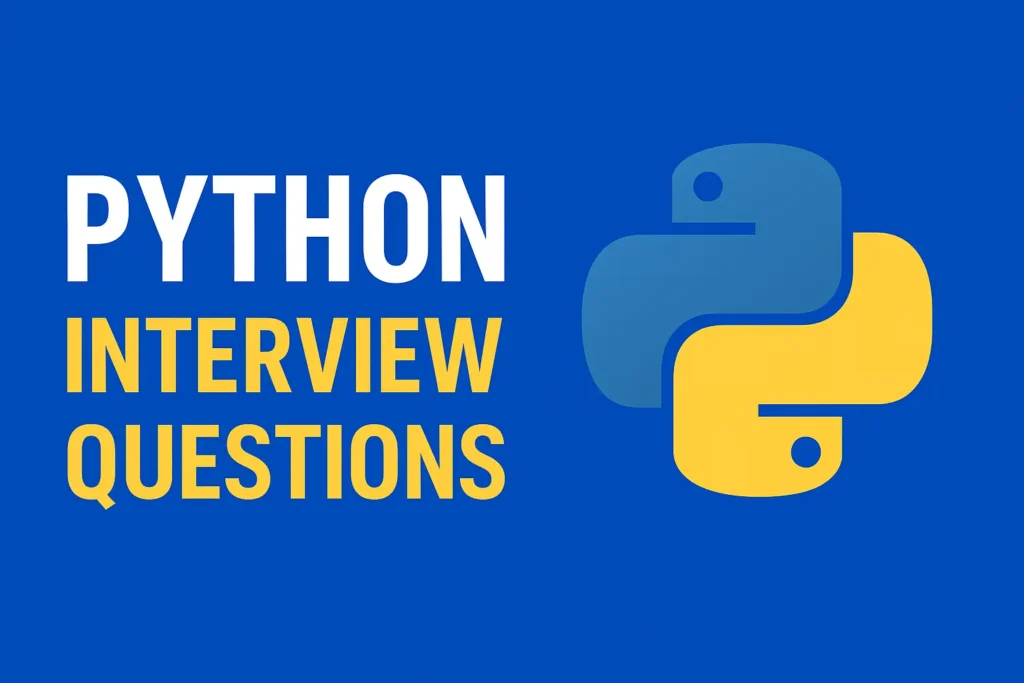In today’s fast-evolving tech industry, mastering Python interview questions is essential for securing top positions in software development, AI, data science, and automation. Python continues to lead as the most versatile and beginner-friendly language, making it a preferred choice for employers worldwide. In this ultimate guide, we present the most comprehensive collection of Python interview questions along with detailed explanations to help you excel in your interview preparation.
Our goal is to ensure you have complete command over fundamental to advanced topics through real-world examples and structured answers. This blog will use the focus keyword Python interview questions multiple times to enhance SEO and ensure strong search engine ranking.
Why Python Interview Questions Matter in 2026
As companies increasingly depend on Python for AI, machine learning, and automation, recruiters expect candidates to be confident with core concepts. Therefore, preparing the right Python interview questions is the key to acing technical assessments.
Whether you are a beginner or a professional aiming for senior roles, this guide will give you a competitive edge through industry-standard explanations.
1. Basic Python Interview Questions
Basic questions set the foundation for more advanced topics. Here are essential Python interview questions typically asked in the initial rounds.
What is Python?
Python is a high-level, interpreted, and general-purpose programming language. It supports object-oriented, functional, and procedural programming styles, making it suitable for nearly every domain.
What are the key features of Python?
- Clean and readable syntax
- Interpreted language
- Dynamically typed
- Extensive standard library
- Cross-platform support
- Strong community resources
2. Python Data Types
Python includes:
- Numeric Types: int, float, complex
- Sequence Types: list, tuple, range
- Mapping Type: dict
- Set Types: set, frozenset
- Boolean Type: bool
- Binary Types: bytes, bytearray
Difference between list and tuple?
- List: Mutable, slower, allows updates
- Tuple: Immutable, faster, memory efficient
These make appearances frequently in Python interview questions for freshers.
3. Python Operators & Expressions
Difference between “==” and “is”?
==checks valuesischecks object identity
What is operator overloading?
Python allows redefining arithmetic operations using methods like __add__, __sub__, etc.
Such topics are repeated across many Python interview questions in technical interviews.
4. Python Conditional Statements & Loops
What are loops in Python?
- for loop – used to iterate over sequences
- while loop – runs until a condition becomes false
5. Python Functions – Crucial Python Interview Questions
What is a function?
A function is a reusable block of code defined using the def keyword.
**Explain *args and kwargs.
*args: handles variable length positional arguments**kwargs: handles variable length keyword arguments
What is a lambda function?
An anonymous, single expression function created using lambda.
These topics appear consistently in all sets of Python interview questions.
6. Object-Oriented Python Interview Questions
What is OOP?
OOP stands for Object-Oriented Programming. Its pillars are:
- Encapsulation
- Inheritance
- Polymorphism
- Abstraction
Explain types of inheritance.
- Single
- Multiple
- Multilevel
- Hierarchical
- Hybrid
A strong understanding of OOP ensures you solve most advanced Python interview questions effectively.
7. Modules and Packages in Python
Difference between module and package.
- Module: single .py file
- Package: collection of modules
How to install a package?
pip install package-name8. File Handling in Python
Types of file modes
r– readw– writea– appendb– binary+– read/write
How to read a file?
with open("file.txt", "r") as f:
data = f.read()
9. Exception Handling Python Interview Questions
What is exception handling?
Managing runtime errors using:
- try
- except
- else
- finally
Why is exception handling important?
It prevents unexpected crashes and improves program stability.
This is repeatedly asked in Python interview questions for full-stack developers.
10. Python Collections – Must-Know Interview Topic
List vs Set
- List: ordered, allows duplicates
- Set: unordered, unique items
What is a dictionary?
A mutable data structure storing key-value pairs.
11. Advanced Python Interview Questions
What is list comprehension?
A concise way to build lists:
[x*x for x in range(10)]
What is a generator?
A function that produces values lazily using yield.
What is GIL (Global Interpreter Lock)?
A mutex that allows only one thread to execute at a time in CPython.
Questions related to GIL often appear in senior-level Python interview questions.
12. Python Coding Interview Questions
Reverse a string.
s = "Python"
print(s[::-1])
Check if a number is prime.
num = 13
if num > 1:
for i in range(2, num):
if num % i == 0:
print("Not Prime")
break
else:
print("Prime")
Factorial using recursion.
def fact(n):
return 1 if n == 0 else n * fact(n-1)
Coding problems form the backbone of Python interview questions across all job roles.
13. Python in AI, Data Science & ML
Most used libraries:
- NumPy
- Pandas
- Matplotlib
- TensorFlow
- PyTorch
Why Python is preferred in ML?
Because of:
- Easy syntax
- Huge ecosystem
- Scalable performance
- Strong community support
Most ML-based Python interview questions revolve around these libraries.
Final Thoughts
Mastering these Python interview questions ensures you are well-prepared for both technical and HR interview rounds. This extensive list helps you build confidence, strengthen your conceptual understanding, and tackle real-world coding tasks effectively.
👉 Apply Now: https://codveda.com/internships


Being in my final year of MCA, I am actively looking for opportunities where I can apply my technical skills and gain practical experience. I am eager to contribute and learn.